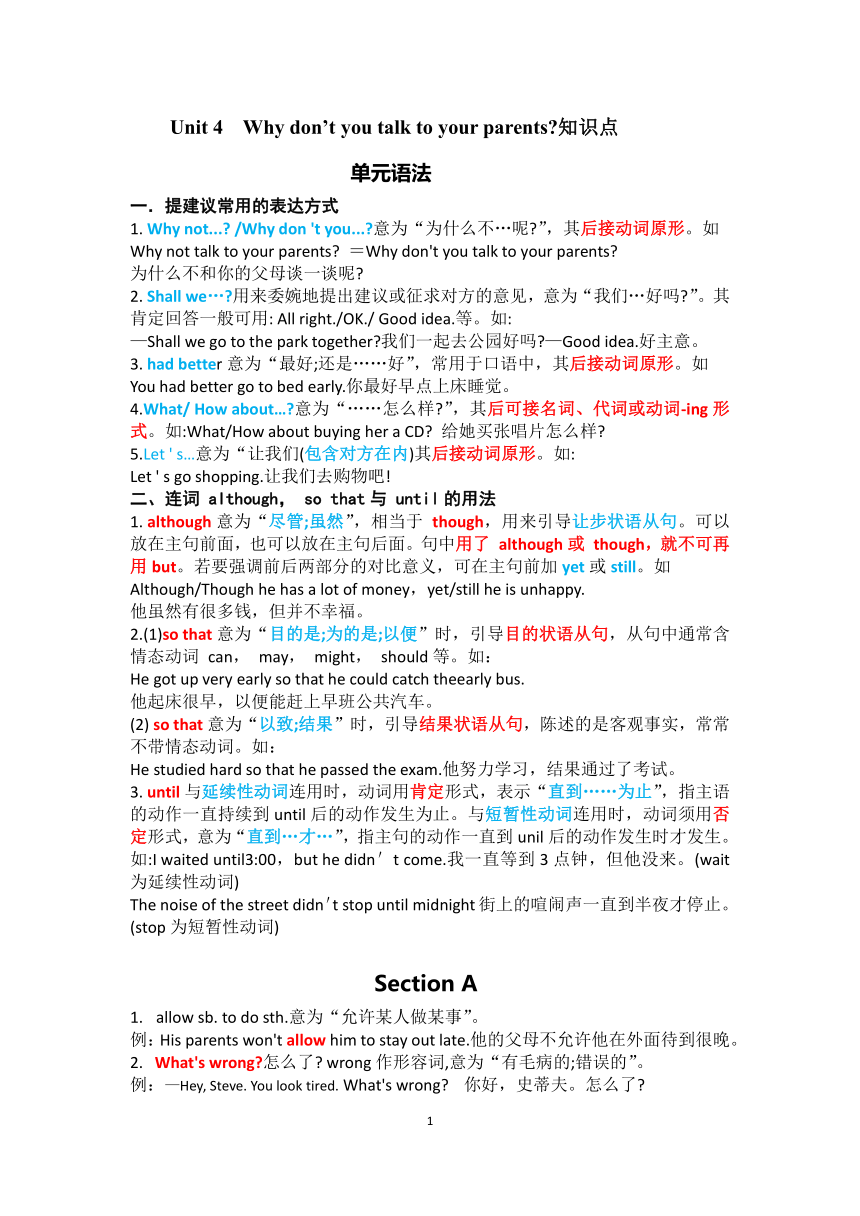
Unit 4 Why don’t you talk to your parents 知识点 单元语法 一.提建议常用的表达方式 1. Why not... /Why don 't you... 意为“为什么不…呢 ”,其后接动词原形。如 Why not talk to your parents =Why don't you talk to your parents 为什么不和你的父母谈一谈呢 2. Shall we… 用来委婉地提出建议或征求对方的意见,意为“我们…好吗 ”。其肯定回答一般可用: All right./OK./ Good idea.等。如: —Shall we go to the park together 我们一起去公园好吗 —Good idea.好主意。 3. had better意为“最好;还是……好”,常用于口语中,其后接动词原形。如 You had better go to bed early.你最好早点上床睡觉。 4.What/ How about… 意为“……怎么样 ”,其后可接名词、代词或动词-ing形式。如:What/How about buying her a CD 给她买张唱片怎么样 5.Let ' s…意为“让我们(包含对方在内)其后接动词原形。如: Let ' s go shopping.让我们去购物吧! 二、连词 although, so that与 until的用法 1. although意为“尽管;虽然”,相当于 though,用来引导让步状语从句。可以放在主句前面,也可以放在主句后面。句中用了 although或 though,就不可再 用but。若要强调前后两部分的对比意义,可在主句前加yet或still。如 Although/Though he has a lot of money,yet/still he is unhappy. 他虽然有很多钱,但并不幸福。 2.(1)so that意为“目的是;为的是;以便”时,引导目的状语从句,从句中通常含情态动词 can, may, might, should等。如: He got up very early so that he could catch theearly bus. 他起床很早,以便能赶上早班公共汽车。 (2) so that意为“以致;结果”时,引导结果状语从句,陈述的是客观事实,常常不带情态动词。如: He studied hard so that he passed the exam.他努力学习,结果通过了考试。 3. until与延续性动词连用时,动词用肯定形式,表示“直到……为止”,指主语的动作一直持续到until后的动作发生为止。与短暂性动词连用时,动词须用否定形式,意为“直到…才…”,指主句的动作一直到unil后的动作发生时才发生。如:I waited until3:00,but he didn't come.我一直等到3点钟,但他没来。(wait为延续性动词) The noise of the street didn't stop until midnight街上的喧闹声一直到半夜才停止。(stop为短暂性动词) Section A allow sb. to do sth.意为“允许某人做某事”。 例:His parents won't allow him to stay out late.他的父母不允许他在外面待到很晚。 2. What's wrong 怎么了 wrong作形容词,意为“有毛病的;错误的”。 例:—Hey, Steve. You look tired. What's wrong 你好,史蒂夫。怎么了 —I didn't sleep well last night. 我昨晚没有睡好。 3. look through是固定短语,意为“快速查看;浏览”。 例:I looked through the notes before the exam.我考试前匆匆看了一下笔记。 4.work out属于“动词+副词”的短语搭配,意为“解决;成功地发展”。如 果宾语是名词,既可以放在out前,也可以放在out后;若宾语是代词,只能放在work和out之间。 例:She is experienced enough to work out the problems. 她足够有经验,能够解决这些问题。 5.get on with是固定短语,表示“和睦相处;相处融洽”,与get along with同义。get on/along well with sb.意为“和某人相处得很好”。 例:They got on well with their classmates.他们和同学们相处得很好。 6.argue作动词,意为“争吵;争论”。argue with sb. about/over sth.表示“就某事和某人争吵/争论”。 例:Don't argue with your parents. 不要和你的父母争吵。 7.offer作动词,意为“主动提出;自愿给予”,offer还可以作名词,意为 ... ...
~~ 您好,已阅读到文档的结尾了 ~~

